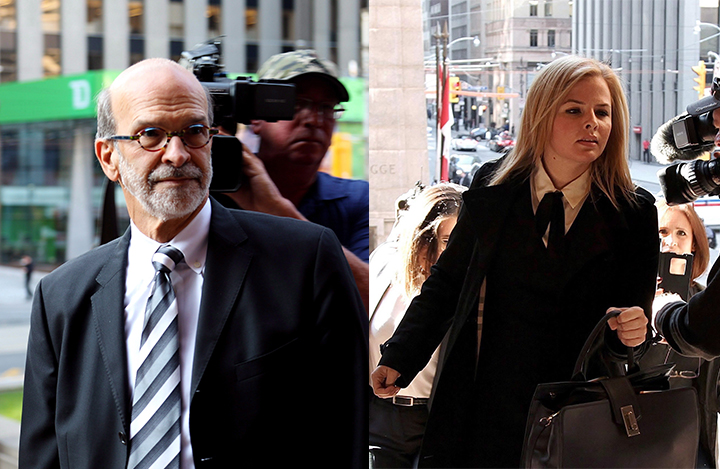TORONTO – Two former top political aides will hear on Thursday whether they need to offer further defence to accusations they illegally destroyed documents about the Ontario government’s politically explosive decision to cancel two gas plants ahead of the provincial election in 2011.

Ontario court Judge Timothy Lipson on Tuesday reserved his decision on a request from David Livington and Laura Miller for a directed acquittal – that he dismiss the case against them without the defence putting forward any evidence.
READ MORE: Crown asks judge for acquittal on breach-of-trust count at gas plants trial
Livingston and Miller, top aides to ex-Liberal premier Dalton McGuinty, argued through their lawyers that the prosecution has failed to prove their guilt on charges of mischief and illegal computer use but prosecutor Tom Lemon said emails from 2012 indicated their culpability.
Among the emails, court heard, were instructions on “double deleting” documents, and discussion of the increasingly tense political situation at the time: A legislature committee and others were requesting documents related to the Liberal government’s decision to scrap and relocate the gas plants, which cost taxpayers more than $1 billion.
WATCH: The Breakdown: What’s at stake for Kathleen Wynne in the gas plant trial

Both Livingston, who was McGuinty’s chief of staff, and his deputy Miller were quick to say they had no records responsive to the information requests, court heard. But Lemon argued the duo knowingly and deliberately wiped computer hard drives in the premier’s office in violation of guidelines and policies related to the records. He also said the pair kept senior bureaucrats in the dark about what they were doing.
“There was no intention to comply with any of those policies,” Lemon told Lipson. “Certainly, they intended to wipe those hard drives.”
WATCH: Gas plant trial latest

While the pair admit deleting about 400 files from 20 computers, they maintain the files contained only personal data or political records they were not obliged to keep. In addition, their lawyers said, no evidence exists to show exactly what was deleted.
“We don’t have to prove that the defendants deleted specific records,” Lemon countered. “The data being wiped did not belong to them.”
In pressing for a directed acquittal, Livingston’s lawyer Brian Gover denied the pair had acted nefariously, stating the deleted emails were “political in nature.” The law, Gover said, only required retention of records of long-term business value to the Ontario government, and the relevant emails about the fallout from the gas-plants decision didn’t qualify.
READ MORE: Ontario gas plants trial hears from IT consultant allegedly hired to wipe hard drives
Miller’s lawyer, Scott Hutchison, said the prosecution had opened its case by suggesting the pair had deleted thousands of documents as part of some “grand conspiracy.” The emails the Crown pointed to as evidence of guilt simply reveal the obvious, Hutchison said:
The government’s gas plants decision had been controversial. “I’m prepared to stipulate there was a political controversy in 2012,” Hutchison said. “If you look at these emails, they are all
political, they are all transient, and none of them would have had to be preserved.”
“Your position is that there were no business records that had to be retained?” Lipson asked.
“None of these emails had to be retained,” Hutchison said. Hutchison said his client’s job related to “political messaging” about the issues of the day and no obligation existed to preserve related discussions.
Lipson appeared to have difficulty that records concerning the government’s decision were “personal.” He also wondered whether freedom of information requests changed the situation, noting the accused said they had no records and then had Miller’s spouse, Peter Faist, wipe the drives.
“There’s no evidence of any (responsive) records actually being destroyed,” Hutchison said. “That’s the problem.”
The prosecution last week admitted it had no case on a third charge against Livingston and Miller, breach of trust.



Comments